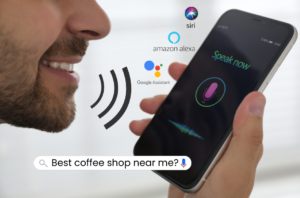As voice search becomes more prevalent, especially for local searches like “best coffee shop near me” or “plumber open now,” businesses need to adapt. Unfortunately, this is easier said than done. Voice search optimization requires a deep understanding of how people speak when asking for information, often using longer, more conversational phrases. This means adjusting your local SEO strategy to focus on natural language queries.
The Rise of Voice Search
Voice search has seen explosive growth in recent years, and it’s estimated that over 50% of all searches could soon be voice-based. People are increasingly using virtual assistants like Siri, Alexa, and Google Assistant to find information, make purchases, and interact with businesses.
The convenience factor is a major driver behind this trend. Voice search allows users to get the information they need without typing, making it ideal for hands-free situations like driving or cooking. It’s faster, too—instead of typing a few words and sifting through several results, users can ask a full question and receive more direct answers.
Understanding Natural Language Processing (NLP)
Natural Language Processing (NLP) is the technology behind how search engines understand and interpret human language. When a user asks a question through voice search, NLP helps platforms like Google process the query’s meaning and context. NLP is essential for voice search, where users tend to phrase queries conversationally, mimicking the way they speak in daily life.
For example, a traditional text search might be as simple as “pizza restaurant Boulder.” In contrast, a voice se arch query could be something like, “Where can I find the best pizza near me?” NLP enables search engines to understand that both queries are asking for the same thing and provide relevant results.
arch query could be something like, “Where can I find the best pizza near me?” NLP enables search engines to understand that both queries are asking for the same thing and provide relevant results.
Google uses NLP to break down the structure of voice queries, understanding not only the keywords but also the intent behind them. As a result, businesses need to shift their SEO approach to optimize for this kind of understanding. Including natural, conversational language in content helps ensure that your site ranks well in voice search results, giving your business the opportunity to connect with potential customers in a more personal, direct way.
Adapting Keyword Strategies for Voice Search
If you’re wondering how to optimize for voice search, you must move beyond traditional short keywords and start focusing on conversational keywords, or the way people naturally speak. Voice searches are more likely to include full sentences or questions, which means the content should be optimized for longer, more specific keyword phrases.
Start by researching conversational keywords using tools like AnswerThePublic or Google’s People Also Ask feature. These tools can provide insights into the types of questions people are asking about your business or industry. For example, instead of targeting “pizza restaurant Boulder,” you might optimize for “Where can I find the best pizza in Boulder?” or “What’s the best pizza place open near me?”
Long-tail keywords are another important aspect of voice search optimization. These keywords are usually longer and more specific, making them less competitive and easier to rank for. While short-tail keywords like “coffee shop” might be highly competitive, targeting “best coffee shop with outdoor seating in Boulder” could make it easier for your business to show up in voice search results.
To fully capture voice search traffic, ensure your website content reflects the way people speak. This could mean incorporating FAQs, using question-based headings, and structuring your content around answering common queries that people might ask through voice search. By adapting your local SEO strategy for these conversational, long-tail keywords, you’ll be better positioned to reach users conducting voice searches.
Featured Snippets and Their Role in Voice Search
Featured snippets, sometimes called “position zero,” are short answers displayed at the top of Google’s search results. They’re incredibly important in local voice search optimization because virtual assistants often pull responses directly from these snippets when answering queries.
For example, if someone asks, “What’s the best way to cook pasta?” the virtual assistant is likely to read the featured snippet for that query. That means optimizing your content for featured snippets significantly increases the chances of your business being the top result, not only in traditional search but also in voice search.
To rank for featured snippets, focus on creating clear, direct answers to common questions. Using question-based headings, bullet points, and well-structured data (like Schema markup) helps search engines identify content that provides relevant answers. Additionally, FAQs on your site are an excellent way to offer concise information that’s snippet-friendly.
Optimizing for Local Voice Search
Voice search is inherently local, with users often asking location-specific queries like “best coffee shop near me” or “plumber open now.” To capture this traffic, local SEO optimization is key. Ensuring your business shows up in relevant local searches means focusing on hyper-local content and maintaining a strong presence on platforms like Google Business Profile (GBP).
Start by updating your GBP with accurate business information, including hours of operation, address, and phone number (NAP consistency). Google prioritizes businesses with complete and updated profiles for local queries, especially in voice search.
Next, focus on location-specific keywords in your content and meta descriptions. Incorporating terms like “near me” or “in [city name]” can help voice search users find your business more easily. Additionally, using structured data for your business’s location details, services, and products makes it easier for search engines to categorize and rank your content.
Finally, ensuring NAP consistency across all online listings (directories, social media, etc.) is essential for trustworthiness and visibility. A consistent online presence not only helps in regular SEO but also improves your chances of showing up in voice searches for local queries.
Mobile and Site Speed Optimization for Voice Search
With most voice searches happening on mobile devices, mobile optimization is crucial for your site’s success in voice search. A mobile-friendly site ensures users can easily access your information without frustration, and it’s a key ranking factor for Google.
Make sure your site is designed with a responsive layout that adapts to different screen sizes, so it’s easy for mobile users to navigate. Just as important is site speed—a slow site leads to a poor user experience and lower rankings in voice search results. To boost loading speed, optimize images, reduce unnecessary plugins, and consider using a content delivery network (CDN) to reduce server load. A fast, mobile-optimized site ensures you meet both user expectations and search engine requirements.
Embrace the Future with Voice Search Optimization
As more customers turn to virtual assistants for quick answers, adapting your local SEO strategy is essential to stay competitive. Don’t let your business fall behind—start implementing voice search optimization today!
If you’re unsure where to begin, Boulder SEO Marketing can help. Contact us to see how your site can be optimized for voice search and to discover untapped opportunities. Let’s make sure your business is heard!
[totalpoll id=”15692″]